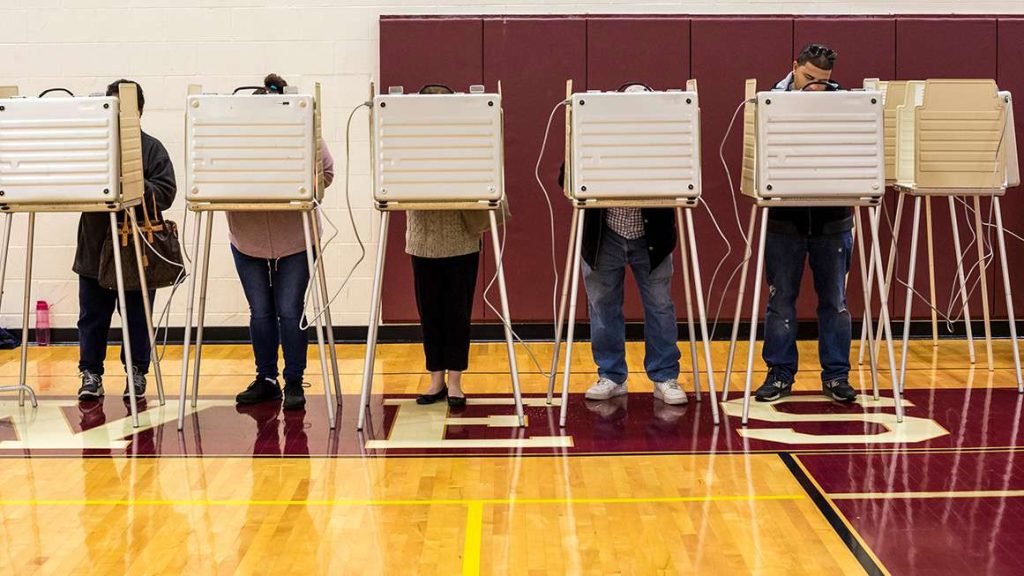The Fear that millions of newly arrived illegal immigrants are swaying federal elections by voting unlawfully has become a recurring theme in debates over immigration.
The idea has so much buy-in that earlier this year, House lawmakers passed the Safeguard American Voter Eligibility (SAVE) Act, which calls for states to “take affirmative steps on an ongoing basis to ensure that only U.S. citizens are registered to vote” in federal elections. Sen. Thom Tillis (R–N.C.), who co-sponsored the Senate version of the SAVE Act, implied that it was a timely—and urgent—attempt to ensure election integrity.
“As millions of illegal immigrants enter our country because of President [Joe] Biden’s failed border policies,” Tillis said, “it is crucial we safeguard our democratic process by ensuring only American citizens can register and vote in our elections.”
The Supreme Court even weighed in on the subject in August. In a 5–4 decision, it allowed Arizona to require proof of citizenship for people registering to vote using a state form (but rejected a request to impose the same restriction on people using a federal form).
It’s been illegal for noncitizens to vote in federal elections for a century. But beyond that, there’s little evidence to suggest that many noncitizens are voting in federal elections, let alone in large enough numbers to sway those races.
In 2017, the Brennan Center for Justice, a progressive nonprofit, interviewed election officials “who oversaw the tabulation of 23.5 million votes in the 2016 general election,” including in many jurisdictions with high populations of noncitizens. The officials “referred only an estimated 30 incidents of suspected noncitizen voting for further investigation or prosecution,” amounting to “0.0001 percent of the 2016 votes in those jurisdictions,” according to the Brennan Center.
The conservative Heritage Foundation, which frequently warns about the danger of noncitizens voting, comes to a similar conclusion. Its database of “election fraud cases” includes around 70 instances of noncitizens voting illegally since 2000, representing under 5 percent of the database. Many of those cases involved lawful permanent residents who were “encouraged by a government official to vote or falsely told that they were eligible,” wrote American Immigration Council Senior Fellow Aaron Reichlin-Melnick.
The trend holds even in states that have recently become election integrity battlegrounds. A 2023 study analyzed by The Washington Post‘s Glenn Kessler recorded “fewer than 1,000 noncitizen votes out of 3.4 million cast in the 2020 election in Arizona,” or 0.0003 percent (assuming 50 percent turnout among registered noncitizens). “At the upper range,” using “less precise records,” Kessler continued, the study indicated less than three-quarters of a percent of voting-age noncitizens in the state “may have voted.” A 2022 Georgia audit found that just over 1,600 noncitizens had tried to register to vote in a 25-year period—but none had successfully registered, and none had voted.
It’s easy to see how a noncitizen might try to register to vote without malicious intent. Federal law requires that local motor vehicle offices allow people to register to vote, and as of last year, 19 states plus the District of Columbia allow undocumented immigrants to get driver’s licenses. They and other noncitizens could understandably, but falsely, think they could answer “yes” when asked if they’d like to register to vote.
The line between noncitizen voter registration and noncitizen voting is often blurred by the media and politicians. Alabama Secretary of State Wes Allen found that over 3,200 people with federal noncitizen identification numbers were registered to vote in his state and swore that he would “not tolerate the participation of noncitizens in our elections,” but his press release didn’t mention whether any of those people had actually voted. “State investigations on noncitizen voter registrations that throw out splashy numbers often end up quietly taking them back when they do a bit more investigating,” wrote Reichlin-Melnick. States that aim to rid their voter rolls of noncitizens risk targeting people who are eligible to vote, including naturalized citizens. Florida and Texas both dropped expansive voter citizenship audits for that reason.
Some argue that an immigrant who breaks the law by illegally crossing the border wouldn’t shy away from breaking the law by voting as a noncitizen, but that’s counterintuitive. Someone trying to live in the country covertly most likely wouldn’t want the unwanted scrutiny and prosecution that voting illegally could bring—the tradeoff simply isn’t worth it. A noncitizen who votes in a federal election is subject to a fine and up to a year in federal prison and might also face deportation or revocation of legal status.
People who point their fingers at noncitizens after elections are decided by slim margins would do well to realize what countless audits and studies have concluded: A vanishingly small number of the country’s noncitizens end up on voter rolls and even fewer of them actually end up voting.
The post The Noncitizen Voting Myth appeared first on Reason.com.






